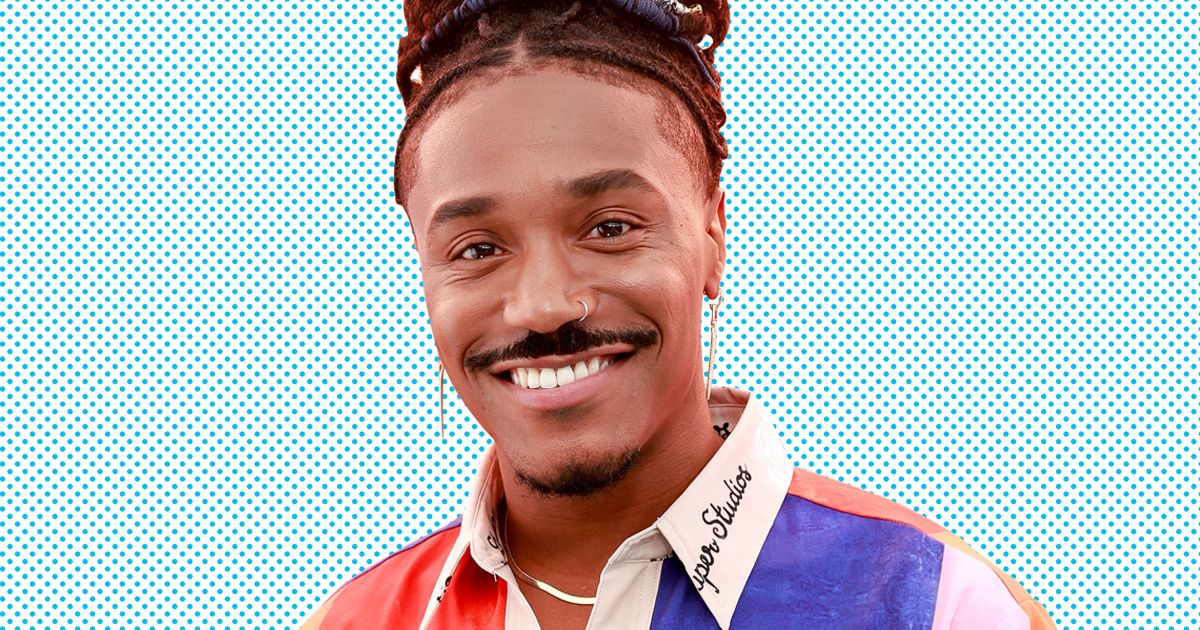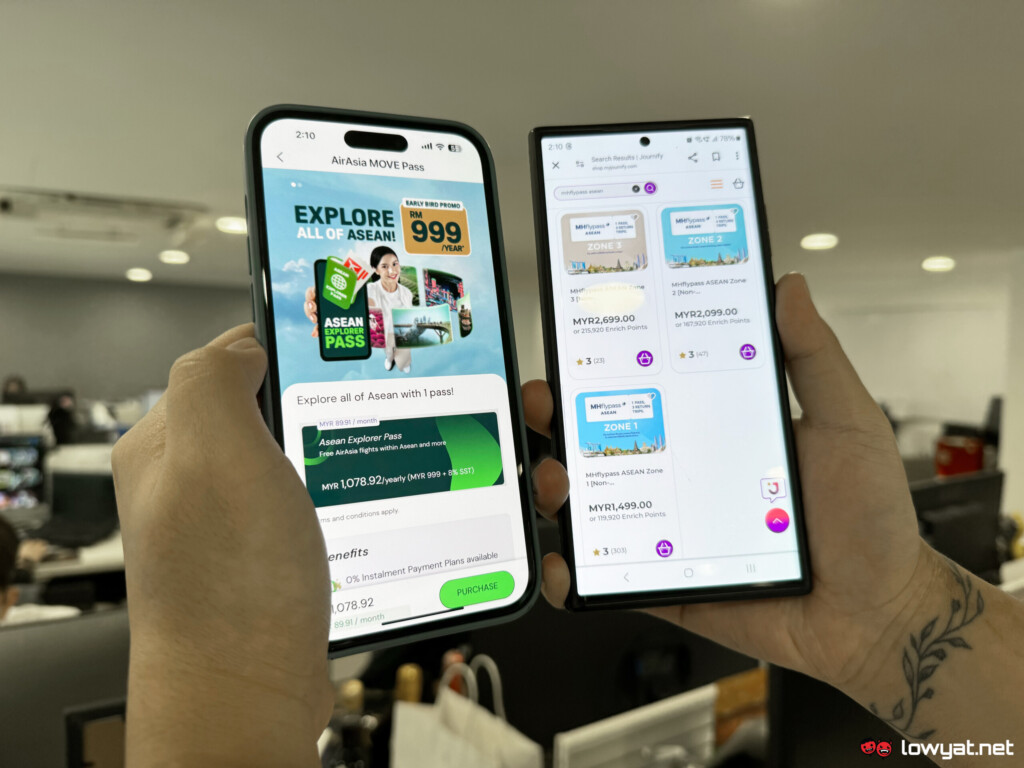
Dewayne Perkins on Being The Blackening’s Queer Final Girl
Dewayne Perkins doesn’t play by cinema’s preestablished rules. His existence as a queer Black man in horror defies the tropes of a genre that has often reduced people like him to inauthentic caricatures or disposable fodder, usually fated to be a slasher villain’s first victims. His new film, The Blackening, on the other hand, skewers those same stereotypes and finds humor in horror’s most predictable clichés.
Perkins’s satirical 2018 comedy sketch, “The Blackening,” was his first attempt at poking fun at how we view Blackness in horror. Now, in collaboration with Girl’s Trip screenwriter Tracy Oliver, who co-wrote the script with Perkins, and director Tim Story (Ride Along, Shaft), he’s turned his self-aware short into a feature-length film in which he co-stars as one of nine friends visiting a spooky cabin in the woods to celebrate Juneteenth. The longtime homies find themselves in peril when an unknown murderer begins hunting them all down. They fight to save one another’s lives, fully aware that their chances of living are slim to none — at least according to the lethal receipts in American horror movies.
The Blackening (tagline: “We can’t all die first”) underscores each character’s Blackness with tongue-in-cheek cues and jokes that only the key players and Black moviegoers would understand. And it does so for a reason, says Perkins. “Cinema just allows characters to be white and exist, so we wanted to have that same energy. Yes, these are Black people and they’re going to be Black and if you don’t know the implications of that, then figure it out. I had to learn how to do that my whole life.”
The last openly gay Black character in a summer horror movie that I can recall is Shawn Wayans in Scary Movie. He played Brenda’s (Regina Hall) closeted boyfriend, and his obvious queerness was the butt of the joke. How does it feel to be a part of the horror canon in a more open way?It feels like such a great privilege. I’m very grateful to be able to have written, acted, and presented an authentic representation of what I feel it means to be Black and queer and doing it in a way where the character’s queerness is not a joke. It’s nothing that’s ever questioned. It’s just a part of who he is that informs how he moves, how he speaks, how he thinks. It’s pushing the genre forward in a very progressive way.
The Blackening stems from a comedy short in which you also named your character Dewayne. Are you performing as yourself, or are you exaggerating or heightening your personality?As the writer, I wanted to be able to give myself that gift of my own name for multiple reasons. One, I think within Black culture, there is this trend where we often call actors by their character names because we really get invested in those characters. For example, Gina from Martin — when people see Tisha Campbell, they’re like, “There goes Gina.” If this movie is a hit, I want people to be able to call me by my name. So that was just my little trick of being able to fully associate myself with this film that I’ve been a part of from the very beginning.
The shared chemistry of the cast makes this horror-comedy so lively. Knowing your background and that of your co-star X Mayo’s, it felt like improv at times. Am I right in suggesting that? The cast was very shocked by how chill and casual I was as the writer. The chemistry was so organic and the performances are so natural that people assume there was more improv than there actually was on set. The script created a really good foundation for what you see onscreen. There are opportunities to kind of adjust things here and there. And Tim Story really created an environment that gave us the freedom to play. But for me, it was more freeing to just be an actor while still giving others access to me as a writer. I thought that was the best dynamic that worked for the film.
What was the intention of setting the film around the day of Juneteenth?That decision kind of came a little later, but we were looking for a reason for the entire friend group to celebrate in the Blackest way possible. We really felt like the themes of the movie were in line with the themes of Juneteenth, in terms of having a community that you are reliant on for your freedom and for your survival.
At one moment, while playing a board game where the group is challenged to name who is the Blackest (and therefore the most likely to die), you scream out that you are gay and go to therapy and Black people don’t go to therapy — which I thought was a very inside joke. The goal was to simply allow the characters to exist fully in the world. As a cast full of Black people, inherently the film will be Black. The task was to show that Blackness can also be universal and nuanced. Survival is universal, community is universal, and friendship is universal. We wanted to allow these Black people to be as specific and unique as they are. It isn’t a definitive statement on Blackness. You’re simply seeing Black people be Black.
After your intoxicated dance break, you throw on a cardigan that spells out “that bitch” on the back — was that written into the script or a costuming decision?The costumers had an idea on how they wanted me to look. Then I walked into my fitting wearing a kimono, and they were saying that was cooler than what they had in mind. So they re-created what I had on, and I asked if they could sew “that bitch” on the back. And they sure did.
The big reveal in The Blackening is when the audience realizes that the twin henchmen were hired to kill you all by your fellow high-school classmate Clifton, played by Jermaine Fowler. What point were you trying to make with this red herring?We knew that based on history and how the horror genre usually is, that people would assume that the killers were white. We used that moment to create the red herring. But when the reveal happens, it’s doubling down on the conversation of what is Blackness. How we can or cannot quantify it and how that affects people. Clifton is the perfect example of the negative ways in which a person has been affected by people trying to quantify their Blackness.
You end up saving the group of friends in your red and blue pullover, like a gay Black Superman. Did you write that heroic moment to underscore that gay characters can be strong and live until the credits roll?That was literally the purpose. Most of the heroes we chose for The Blackening are the most marginalized in the Black community, and we continue to always empower them the most. So if you can see the straight Black men become the head of the household and be the top of the hierarchy, the gay man can be the final girl too. I want to force people to expand the boxes in which they think these characters can exist, to show people that, yes, the gay best friend can also be the hero if you just let them. I really hope that after The Blackening, audiences see the possibilities in which these characters can be used beyond stereotypes.
What do you look forward to writing next? Knowing that you can continue expanding different genres and canons of film with your fresh perspective.Continuously breaking down the confines around identity, around that kind of hold that pulls these genres back. I realized by doing The Blackening that you can really push genre forward by simply allowing new voices to exist in that space and then authentically moving through without adjusting who they are. That is new, because you simply have not seen those people exist in these spaces. So my goal would be to do that with all kinds of genres, such as action movies and rom-coms. Those are the two I’m most excited to work in next. I love action movies, and I would love to write a queer rom-com. Yes, she gives. She will continue to expand the queer Black point of view to show people that this community is real and multifaceted, that we are not just what you may think we are — that’s just what the media has shoehorned queer Blackness to be.
This interview has been edited and condensed for clarity.









![[VIDEO] Gelagat Che Ta Tunggu Aaisyah Bersiap Cetus Perhatian Ramai!-“Tengok Penampilan, Tercampaklah Mak Hang!” [VIDEO] Gelagat Che Ta Tunggu Aaisyah Bersiap Cetus Perhatian Ramai!-“Tengok Penampilan, Tercampaklah Mak Hang!”](https://i0.wp.com/murai.my/wp-content/uploads/2024/04/25DCA8CF-C629-4DCA-8597-2CA8819D9297.jpg?resize=150%2C150&ssl=1)














![[VIDEO] Reaksi Tunku Azizah Sambut Birthday Anakanda Tengku Puteri Jihan, Raih Perhatian Ramai! [VIDEO] Reaksi Tunku Azizah Sambut Birthday Anakanda Tengku Puteri Jihan, Raih Perhatian Ramai!](https://i0.wp.com/murai.my/wp-content/uploads/2024/04/Untitled-design-27.jpg?fit=300%2C300&ssl=1)










![[VIDEO] Nadhir Nasar Sambut Birthday Tengku Ameera Cetus Perhatian Ramai”- Nak Kena Bersaing Dengan Kerabat Pulak, Hmm” [VIDEO] Nadhir Nasar Sambut Birthday Tengku Ameera Cetus Perhatian Ramai”- Nak Kena Bersaing Dengan Kerabat Pulak, Hmm”](https://i0.wp.com/murai.my/wp-content/uploads/2024/04/D3415DF6-2464-4794-880F-841EB898C969.jpg?w=768&ssl=1)































